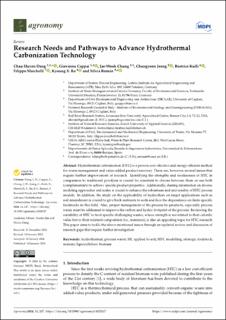Please use this identifier to cite or link to this item:
https://doi.org/10.21256/zhaw-29895Full metadata record
| DC Field | Value | Language |
|---|---|---|
| dc.contributor.author | Dang, Chau Huyen | - |
| dc.contributor.author | Cappai, Giovanna | - |
| dc.contributor.author | Chung, Jae-Wook | - |
| dc.contributor.author | Jeong, Changyoon | - |
| dc.contributor.author | Kulli Honauer, Beatrice | - |
| dc.contributor.author | Marchelli, Filippo | - |
| dc.contributor.author | Ro, Kyoung S. | - |
| dc.contributor.author | Román, Silvia | - |
| dc.date.accessioned | 2024-02-15T12:28:15Z | - |
| dc.date.available | 2024-02-15T12:28:15Z | - |
| dc.date.issued | 2024-01 | - |
| dc.identifier.issn | 2073-4395 | de_CH |
| dc.identifier.uri | https://digitalcollection.zhaw.ch/handle/11475/29895 | - |
| dc.description | Review Paper | de_CH |
| dc.description.abstract | Hydrothermal carbonization (HTC) is a proven cost-effective and energy-efficient method for waste management and value-added product recovery. There are, however, several issues that require further improvement or research. Identifying the strengths and weaknesses of HTC in comparison to traditional pyrolysis is crucial for scientists to choose between them or use both (complementary) to achieve specific product properties. Additionally, sharing information on diverse modeling approaches and scales is crucial to enhance the robustness and universality of HTC process models. In addition, the study on the applicability of hydrochars on target applications such as soil amendment is crucial to give back nutrients to soils and face the dependence on finite specific feedstocks in this field. Also, proper management of the process by-products, especially process water, must be addressed to improve the carbon and hydric footprint of the process. Reviewing the suitability of HTC to treat specific challenging wastes, whose strength is not related to their calorific value but to their nutrient composition (i.e., manures), is also an appealing topic for HTC research. This paper aims to tackle the above-mentioned issues through an updated review and discussion of research gaps that require further investigation. | de_CH |
| dc.language.iso | en | de_CH |
| dc.publisher | MDPI | de_CH |
| dc.relation.ispartof | Agronomy | de_CH |
| dc.rights | http://creativecommons.org/licenses/by/4.0/ | de_CH |
| dc.subject | Hydrothermal carbonization (HTC) | de_CH |
| dc.subject | Soil | de_CH |
| dc.subject | Process water | de_CH |
| dc.subject | Biochar | de_CH |
| dc.subject | Hydrochar | de_CH |
| dc.subject | Pyrochar | de_CH |
| dc.subject | Manure | de_CH |
| dc.subject | Strategic feedstock | de_CH |
| dc.subject | Lignocellulosic biomass | de_CH |
| dc.subject.ddc | 660: Technische Chemie | de_CH |
| dc.title | Research needs and pathways to advance hydrothermal carbonization technology | de_CH |
| dc.type | Konferenz: Paper | de_CH |
| dcterms.type | Text | de_CH |
| zhaw.departement | Life Sciences und Facility Management | de_CH |
| zhaw.organisationalunit | Institut für Umwelt und Natürliche Ressourcen (IUNR) | de_CH |
| dc.identifier.doi | 10.3390/agronomy14020247 | de_CH |
| dc.identifier.doi | 10.21256/zhaw-29895 | - |
| zhaw.conference.details | 3rd Symposium on Hydrothermal Carbonization : ECD HTC Roadmap Workshop, Seoul, South Korea, 10-13 May 2023 | de_CH |
| zhaw.funding.eu | No | de_CH |
| zhaw.issue | 2 | de_CH |
| zhaw.originated.zhaw | Yes | de_CH |
| zhaw.pages.start | 247 | de_CH |
| zhaw.publication.status | publishedVersion | de_CH |
| zhaw.volume | 14 | de_CH |
| zhaw.publication.review | Peer review (Publikation) | de_CH |
| zhaw.webfeed | Bodenökologie | de_CH |
| zhaw.author.additional | No | de_CH |
| zhaw.display.portrait | Yes | de_CH |
| Appears in collections: | Publikationen Life Sciences und Facility Management | |
Files in This Item:
| File | Description | Size | Format | |
|---|---|---|---|---|
| 2024_Dang-etal_Research-needs-advance-hydrothermal-carbonization-technology_MDPI.pdf | 1.59 MB | Adobe PDF |  View/Open |
Show simple item record
Dang, C. H., Cappai, G., Chung, J.-W., Jeong, C., Kulli Honauer, B., Marchelli, F., Ro, K. S., & Román, S. (2024). Research needs and pathways to advance hydrothermal carbonization technology [Conference paper]. Agronomy, 14(2), 247. https://doi.org/10.3390/agronomy14020247
Dang, C.H. et al. (2024) ‘Research needs and pathways to advance hydrothermal carbonization technology’, in Agronomy. MDPI, p. 247. Available at: https://doi.org/10.3390/agronomy14020247.
C. H. Dang et al., “Research needs and pathways to advance hydrothermal carbonization technology,” in Agronomy, Jan. 2024, vol. 14, no. 2, p. 247. doi: 10.3390/agronomy14020247.
DANG, Chau Huyen, Giovanna CAPPAI, Jae-Wook CHUNG, Changyoon JEONG, Beatrice KULLI HONAUER, Filippo MARCHELLI, Kyoung S. RO und Silvia ROMÁN, 2024. Research needs and pathways to advance hydrothermal carbonization technology. In: Agronomy. Conference paper. MDPI. Januar 2024. S. 247
Dang, Chau Huyen, Giovanna Cappai, Jae-Wook Chung, Changyoon Jeong, Beatrice Kulli Honauer, Filippo Marchelli, Kyoung S. Ro, and Silvia Román. 2024. “Research Needs and Pathways to Advance Hydrothermal Carbonization Technology.” Conference paper. In Agronomy, 14:247. MDPI. https://doi.org/10.3390/agronomy14020247.
Dang, Chau Huyen, et al. “Research Needs and Pathways to Advance Hydrothermal Carbonization Technology.” Agronomy, vol. 14, no. 2, MDPI, 2024, p. 247, https://doi.org/10.3390/agronomy14020247.
Items in DSpace are protected by copyright, with all rights reserved, unless otherwise indicated.